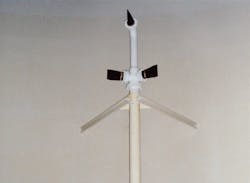The Taste of Success
Imagine having the best-tasting water in America. Mt. View–Edgewood Water Co. (MVEWC), located in the state of Washington, won this top honor in the 13th National Rural Water Assn.’s Great American Water Taste Test, held in Washington, D.C.
Additional honors went to MVEWC Field Manager Mike Craig, who was recognized as the Water System Operator of the Year. This highly coveted award, presented by Evergreen Rural Water of Washington state, recognizes the top water system operator in Washington for superior achievement.
Since 1925, the Mountain View/Edgewood community has worked together to build a member-owned utility that provides quality drinking water and fire protection. MVEWC does not add any chemicals to its water. The water is delivered to customers without chlorine, fluoride or any other chemicals. The water is filtered slowly and naturally through glacial gravels deep beneath the earth’s surface. The aquifer does not contain naturally occurring elements that affect taste, acidity or hardness. The focus of MVEWC’s staff is prevention, best practices of operations, design and continuous improvement to deliver the best-tasting water nature has to offer.
MVEWC’s water storage consists of two steel tanks (South reservoirs), which provide a combined total of 1.2 million gal, and one steel 1.0-million-gal reservoir (North Reservoir). Built in 2000, the North Reservoir is 80 ft in diameter and 32 ft tall. It was designed with a 16-ft-tall inlet riser pipe and an outlet pipe placed 180 degrees opposed to the inlet.
The Problem
Computational fluid dynamics (CFD) modeling by Tideflex Technologies determined this configuration is highly prone to stratification and short-circuiting. In summer, inlet water is colder and denser; therefore, it is negatively buoyant and it sinks. While the physical separation of inlet and outlet pipe makes intuitive sense, science proves that it does not improve mixing and does not prevent the tank from stratifying and short-circuiting. The key to achieving complete mixing and improving water quality is the proper design of a multiport mixing system that distributes the inlet flow momentum through the tank and ensures inlet jets reach the water surface during summer negatively buoyant scenarios.
During investigative sampling (at the discharge), the North Reservoir had a total coliform positive result and a heterotrophic plate count (HPC) of 250 colony-forming units (CFU)/mL. Follow-up in-tank sampling indicates HPC at more than 30,000 CFU/mL at the top; the HPC is normally between 0 and 8 for the system. MVEWC determined that the tank was severely stratified, causing the elevated HPC throughout the tank.
Mike Craig
The Solution
MVEWC turned to Tideflex Technologies for a solution. Using data from MVEWC, along with CFD and field-validated models, Tideflex engineered a Tideflex Mixing System (TMS) to ensure complete mixing within the North Reservoir.
The inlet riser was converted into a multiport TMS with three Tideflex inlet nozzles. The quantity, size, relative stiffness, elevation and discharge angles were designed based on CFD and field-validated models. MVEWC normally cycles the tank daily between 21 and 29 ft, recognizing that sufficient turnover to minimize water age is very important for ensuring that quality water is being delivered to MVEWC customers. The TMS simply utilizes existing differential pressure available in the distribution system as the only energy source to mix the tank; there is no need to pay for energy twice. Tideflex valves used within the TMS have a variable orifice that enables maximized jet velocity at all flow rates. Higher inlet jet velocities will produce circulation patterns within the tank that not only maintain water quality by mixing the entire tank, but also help prevent ice formation in cold weather. The TMS is truly a green technology, while the all-elastomer construction of the Tideflex valves renders the system virtually maintenance-free.
[Click here to check out Red Valve Co. & Tideflex Technologies' W&WD Storefront]
The Results
“After proper mixing with the Tideflex Mixing System, we eliminated the coliform, and the HPC dropped to 7,” Craig said. “I was amazed the reservoir designer did not take tank mixing into account, especially for a non-chlorinated system. We test our reservoirs monthly for HPC and they continue to pass well below the standards. We competed in Washington, D.C. for the ‘best water in the nation’ award and won.”
“Mother Nature provides us with a pure, naturally filtered product,” said Marc Marcantonio, MVEWC general manager. “It is our job to make sure we preserve that quality. Keeping our water pure from the source to the tap makes more sense than allowing it to become contaminated and then trying to purify it with chemicals.”
